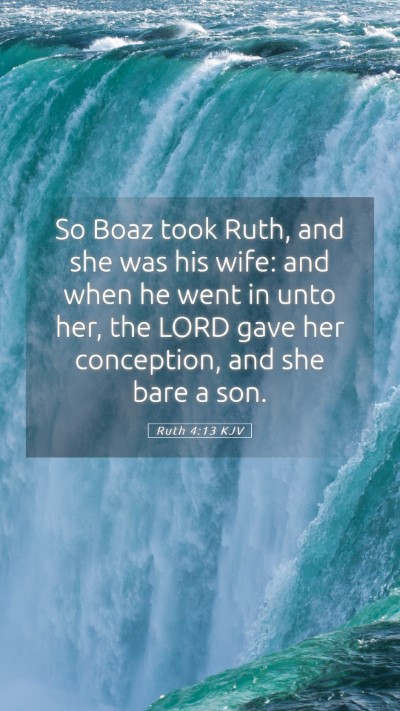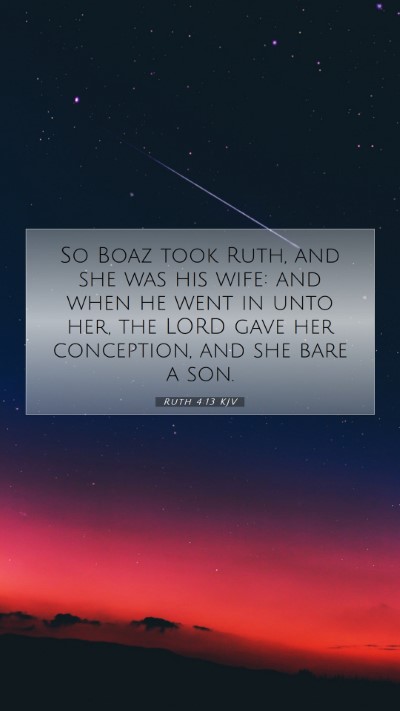Old Testament
Genesis Exodus Leviticus Numbers Deuteronomy Joshua Judges Ruth 1 Samuel 2 Samuel 1 Kings 2 Kings 1 Chronicles 2 Chronicles Ezra Nehemiah Esther Job Psalms Proverbs Ecclesiastes Song of Solomon Isaiah Jeremiah Lamentations Ezekiel Daniel Hosea Joel Amos Obadiah Jonah Micah Nahum Habakkuk Zephaniah Haggai Zechariah MalachiRuth 4:13 Meaning
What is the meaning of Ruth 4:13?
So Boaz took Ruth, and she was his wife: and when he went in unto her, the LORD gave her conception, and she bare a son.
Ruth 4:13 Bible Verse Meaning
Bible Verse Commentary: Ruth 4:13
Ruth 4:13: "So Boaz took Ruth, and she was his wife: and when he went in unto her, the LORD gave her conception, and she bare a son."
Understanding the Passage
This verse marks a pivotal moment in the Book of Ruth, illustrating the fulfillment of God's providential plan through the marriage of Boaz and Ruth. The union signifies not just personal affection but also divine favor and ancestral continuity, which plays a foundational role in the lineage of David.
Insights from Biblical Commentaries
-
Matthew Henry:
Matthew Henry emphasizes the gracious hand of God in the conception of Ruth's child, indicating that God is the ultimate source of life and blessing. He views Ruth's marriage to Boaz not just as a romantic union but a significant part of God’s redemptive plan for Israel.
-
Albert Barnes:
Albert Barnes interprets this event as the result of obedience to God's law regarding levirate marriage, which ensured family lineage and protection. His commentary highlights that Boaz acted nobly in fulfilling this duty, thus demonstrating qualities of righteousness and social responsibility.
-
Adam Clarke:
Adam Clarke provides detailed insights into the role of Ruth as a Moabite in Israelite society and the significance of her son, Obed. He points out that her inclusion in the lineage of David reflects God’s plan to incorporate all nations into His fold, emphasizing the universality of God’s grace.
Theological Significance
Divine Providence: The verse illustrates the theme of divine providence. Ruth, a foreigner, is included in God's covenant community, signifying that His grace extends beyond ethnic and social boundaries.
Fulfillment of God’s Plan: The birth of Obed not only fulfills Naomi’s hopes but also sets the stage for the emergence of King David, illustrating how God orchestrates events for a greater purpose.
Cultural Context
The custom of levirate marriage was designed to maintain family lineage and protect vulnerable widows. Understanding this cultural backdrop is critical for grasping the significance of Ruth’s actions and Boaz's willingness to marry her.
Practical Applications
This verse encourages readers to see the workings of God in their lives, even when circumstances seem unlikely or impossible. It invites believers to reflect on their own callings in the context of God’s greater purpose.
Conclusion
Ruth 4:13 encapsulates a rich tapestry of themes including love, redemption, and divine providence. As part of studying Scriptures, engaging with this verse allows for deeper biblical exegesis and a profound understanding of how God works through the lives of individuals to accomplish His salvation plan.
Related Bible Cross References
- Genesis 38:8-10: The law regarding levirate marriage in the context of Judah and Tamar.
- Matthew 1:5-16: The genealogy of Jesus, highlighting Ruth's significance in salvation history.
- 1 Samuel 16:1-13: The anointing of David, Ruth's great-grandson, showing the fulfillment of God’s promise.
- Deuteronomy 25:5-10: The explicit instructions regarding levirate marriage.


